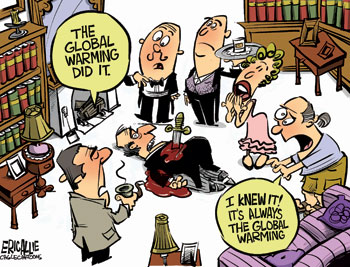
Last December in Copenhagen at the United Nations climate summit, officials and global-warming alarmists seemed confident of their imminent triumph. “There is no doubt in my mind whatsoever that it will yield a success,” proclaimed UN global-warming chief Yvo de Boer just weeks before the conference.
But Copenhagen was not the victory de Boer had been anticipating. In fact, most analysts labeled it a significant setback for the alarmist agenda. And since then, problems for the human-caused warming campaign have only grown. After a series of scandals exposed extreme misconduct (if not criminality) by leading climate scientists and errors surrounding the movement’s theories, pundits began announcing the inevitable collapse of climate hysteria. But the vested interests will not go down without a long, hard fight.
Scandals
The climate alarmists were already doing poorly in the United States before the Copenhagen failure. An October 2009 Pew poll showed that only 36 percent of Americans even believed in man-made global warming. The issue consistently ranked last among public priorities. Commentators referred to the movement as a “cult,” and critics ridiculed the theories and dangerous “solutions” all over the Internet. And that was before the proverbial hitting of the fan late last year.
In November 2009, a scandal now known as Climategate changed everything. Just before the much-touted global-warming conference, incriminating e-mails and data from the University of East Anglia’s Climatic Research Unit were revealed to the world. And the picture was not pretty. Prominent climate scientists, including many who were deeply involved with the Intergovernmental Panel on Climate Change (IPCC) report, were exposed plotting to “hide the decline” in global temperatures, conspiring to violate Freedom of Information laws, and scheming to keep contradictory viewpoints excluded. The scandal led to even more distrust of the alarmist narrative.
After Climategate made headlines around the world, obvious factual errors started turning up in the UN’s IPCC report as researchers began scrutinizing it more closely. Widely considered the “gospel” of the anthropogenic-warming campaign, the report was rapidly losing credibility.
First came “Glaciergate.” In its final report, the IPCC suggested that Himalayan glaciers could melt by 2035 or sooner. It turns out the wild assertion (along with several others in the same paragraph) was lifted from an advocacy group’s propaganda literature, which took it from an Indian magazine article that has since been discredited. The claim was totally incorrect. The IPCC has been forced to recant it.
More errors were soon exposed in a flurry of bad press for the alarmists. Amazongate, as it has become known, involved fantastical predictions about global warming’s effect on the Amazon rain forest. Up to 40 percent of it could be in danger, according to the report. The IPCC also took this claim from advocacy group literature. But on top of that, it incorrectly attributed it to a report that did not even hint at such a prediction. Critics have correctly labeled the assertion a “fabrication.”
 There was also Africagate. The IPCC erroneously claimed that rain-dependent agriculture in some African countries could be cut in half by 2020, with the wildly inaccurate claims also taken from an advocacy group report (written by an academic who works with “carbon credits”). Of course, this was also wrong. But this time, IPCC Chair Rajendra Pachauri was the one responsible for allowing the error to be repeated in the condensed “Synthesis Report.”
There was also Africagate. The IPCC erroneously claimed that rain-dependent agriculture in some African countries could be cut in half by 2020, with the wildly inaccurate claims also taken from an advocacy group report (written by an academic who works with “carbon credits”). Of course, this was also wrong. But this time, IPCC Chair Rajendra Pachauri was the one responsible for allowing the error to be repeated in the condensed “Synthesis Report.”
Questions and criticism about the use of temperature data have also been ongoing and continue to plague the UN panel’s credibility. “Chinagate,” where scientists misused Chinese temperature records, is just one example.
The claims of increased hurricane frequency were also proven fraudulent. And as if those blows were not enough, the Dutch government recently forced the IPCC to retract its claim that 55 percent of the Netherlands was below sea level. It’s actually 26 percent.
The rapid loss of public credibility over all the errors has also accompanied numerous calls by prominent voices for official inquiries and even criminal investigations. Several universities involved have already launched reviews. And even previous IPCC chief Professor Robert Watson, for example, is calling for a probe to investigate “warming bias” by the UN panel. “The mistakes all appear to have gone in the direction of making it seem like climate change is more serious by overstating the impact. That is worrying,” he told the U.K. Times Online. “The IPCC needs to look at this trend in the errors and ask why it happened.” The UN will indeed launch an “independent” inquiry, but critics generally expect a coverup.
U.S. Senator James Inhofe (R-Okla.) went further, proposing criminal investigations to determine if alarmists violated any laws. A Senate report produced for Inhofe’s Environment and Public Works Committee concluded that, among other problems, “scientists involved in the CRU controversy violated fundamental ethical principles governing taxpayer-funded research and, in some cases, may have violated federal laws.”
Similarly, British authorities were investigating possible criminal activity by Climategate scientists who refused to provide documents and data under lawful Freedom of Information requests. The scientists may reportedly escape prosecution under the FOI law because of a six-month statute of limitations.
Rats and Ships
Even the politicians and officials still pushing the alarmist agenda have distanced themselves from the IPCC report. The analogy of “rats” frantically ditching a “sinking ship” has been used by numerous critics to describe the situation.
Climate chief Yvo de Boer, the executive secretary of the UN Framework Convention on Climate Change who predicted “success” in Copenhagen, announced his resignation in mid-February. He said it was time to pursue “new challenges.” But he still advises companies about global warming.
Even a prominent member of the pro-United Nations, internationalist Council on Foreign Relations has thrown in the towel, possibly trying to salvage some credibility by denouncing the scandals. “The global warming movement as we have known it is dead” because of “bad science and bad politics,” wrote CFR senior foreign policy fellow Walter Mead in a piece for The American Interest. He still believes in human-caused warming, but harshly criticized the movement for its lawbreaking and phony claims. “The global warming meltdown confirms all the populist suspicions out there about an arrogantly clueless establishment invoking faked ‘science’ to impose cockamamie social mandates on the long-suffering American people, backed by a mainstream media that is totally in the tank,” he rightly concluded.
Prominent companies that were once leading the push for “action” on climate change have also been retreating to the shadows. Around the time of de Boer’s announcement, three large American firms (including two oil companies) bailed on the U.S. Climate Action Partnership, a powerful lobby pushing for “cap and trade” legislation.
Some of the media have also finally started to report the apparent demise of climate alarmism. “The strategy pursued by activists (including scientists who have crossed the line into advocacy) has turned out to be fatally flawed,” declared the Canadian Globe and Mail in a recent article entitled “The great global warming collapse: As the science scandals keep coming, the air has gone out of the climate-change movement.”
Even a writer for the BBC admitted the campaign was falling apart in a recent piece entitled “The dam is cracking.” This same media organization has in recent years issued dire predictions of global warming almost daily and last year sat on the Climategate e-mails for over a month. (The BBC claims it wasn’t aware of the significance of the information it was given.)
The “neoconservative” Weekly Standard — normally a promoter of the glob-alist establishment’s agenda — actually ran a cover story recently with a cartoon depicting polar bears laughing at a naked and freezing Al Gore. The article, entitled “In Denial — The meltdown of the climate campaign,” was written by fellow Steven Hayward with the American Enterprise Institute, an organization that has repeatedly peddled climate propaganda and the desirability of “emission reductions” and a “carbon tax.” More rats jumping ship?
Even alarmism ringleader Al Gore seemingly conceded defeat on the impact of his efforts to “educate” the public on human-caused climate change. “I have thus far failed,” he told a Norwegian talk show in early March while promoting his new climate book. But, his fight is far from over.
Alarmists Fight Back
Ironically, some of the news articles announcing the demise of climate hysteria were adorned with government-funded Google ads from the State Department reading “Adapting to a Changing Climate.” The link takes readers to America.gov, where articles like “The Need for Action on Climate Change Is Urgent” share the page with a picture of a lonely polar bear and propaganda videos citing the IPCC. (What part of the Constitution authorizes government propaganda ads?) Government has obviously not given up the fight.
Indeed — like an animal backed into a corner — committed alarmists are putting up an increasingly hysterical battle as their movement begins to unravel. The U.K. Telegraph ran a piece entitled “Warmists overwhelmed by fear, panic and deranged hatred as their ‘science’ collapses.”
There are many players with a significant stake in making sure the public believes “climate change” is caused by man and carbon emissions. Governments have invested hundreds of billions in it — likely because greenhouse-gas legislation will allow government to monitor and control almost everything every citizen does. Banks, too, have vast sums tied up in the scheme — including Goldman Sachs, one of the most powerful firms on Earth — because they stand to make piles of money trading carbon permits. Gore and Pachauri have their fortunes and their reputations at stake. Many climatologists have their careers to lose, too.
“I, for one, genuinely wish that the climate crisis were an illusion,” wrote Gore in a wildly inaccurate editorial temper tantrum printed by the New York Times on February 27. Then he proceeded to the usual scaremongering, warning about “the displacement of hundreds of millions of climate refugees” and other calamities. Former Vice President Gore intensified his lobbying efforts, consolidating two of his organizations “to create in one [sic] of the largest non-profit climate change education and advocacy organizations in the world,” according to a March 5 press release posted on its website. Will Gore go down with the alarmism ship? As its captain, he probably has no choice at this point — though unlike the captain of the Titanic, his action will likely be viewed as less than noble.
Scientists under fire have also attempted to deflect criticism by demonizing skeptics. Stanford climatologist Stephen Schneider, for example, complained of receiving “threatening” e-mails. “They shoot abortion doctors here,” he told Tierramérica, a UN-affiliated propaganda organ in Latin America.
And just as global warming was re-branded “climate change” to be more all-encompassing, some Senators are now trying to deviously re-sell the “cap and trade” scheme with linguistic gimmicks. “We will have pollution reduction targets,” explained Senator Joseph Lieberman, ignoring the fact that CO2 is not a pollutant but an essential component of life without which green plants would cease to exist.
And despite the apparent implosion of the alarmist movement, governments are steamrolling ahead with the agenda. The taxation commissioner at the European Commission, for example, recently announced a push for EU-wide carbon taxes.
A recently leaked UN Environment Program document from December 2009 revealed plans to create a “green world order” by 2012, while the head of the International Monetary Fund recently called for the creation of a giant climate-change slush fund. And in the United States, despite bipartisan opposition and the lack of constitutional authority, the Environmental Protection Agency is still moving forward with its anti-CO2 regulation regime. Other national governments around the world are also marching forward with various climate schemes.
More to Come
The fight is not over yet. But no matter what happens in the coming months and years — trials and convictions for climate swindlers, or taxes on breathing for everyone on Earth — the alarmist campaign will eventually fall.
“There’s a lot more to come out yet about the [Climategate] e-mails, and how they cooked the computer models,” said Canadian climatologist Dr. Tim Ball, who emphasized that he never received money from oil companies and that he was also against the “global cooling” alarmism of a few decades ago.
He told The New American that the Internet played a pivotal role in exposing the scandals, and that this phenomenon will continue. “It’s no coincidence that so much of what was exposed came through the blogs.… The mainstream media is ignoring the issues almost completely. And it’s because most of them were complicit and bought into the argument.” As a consequence, the complicit media is becoming increasingly irrelevant.
But the battle against the alarmist agenda will likely be protracted and difficult. “It won’t die — it simply won’t die — until the economies start to suffer,” Dr. Ball said about the carbon tax and cap-and-trade schemes, citing Spain’s experience with new “green jobs” causing an overall loss of jobs as an example of the economic price of alarmist policies. But, he added, the truth will inevitably triumph eventually.
“Reality always comes through, sooner or later, it’s just that sometimes it takes a long time,” agreed Professor Nils-Axel Mörner, one of the world’s foremost experts on sea levels and the head of the Paleogeophysics and Geodynamics Department at Stockholm University until he retired in 2005. He told The New American that as an expert reviewer for the sea-level section of the IPCC report, he had the opportunity to understand the inner workings of the IPCC. And it is doomed to fail eventually.
The sea-level chapter he was supposed to review was “of very poor quality,” Mörner said. And the hysteria surrounding sea-level rises, like most of the IPCC scaremongering, “is not grounded in reality.” The panel chose authors based on loyalty, not credentials, Mörner explained. And though he warned the IPCC of errors, they mostly ignored the advice. But the anti-science attitude came back to haunt them. Climategate was “wonderful,” Mörner exclaimed. He called the scandal an “iceberg of shame,” noting that there was still much to be discovered.
“The first thing which has to come now is the restoration of scientific values,” he said, explaining that the climate campaign had “autocratically” tried to impose beliefs on the public that were not based on science. “Al Gore is a salesman, not a scientist, and we don’t need salesmen.” Mörner is optimistic.
Despite all the trouble and wasted resources expended on the movement, there is certainly a bright side emerging as the climate-crisis crusade self-destructs. For one, more people may begin to think twice before blindly trusting governments and the media. Additionally, the whole episode illustrates the crumbling gate-keeping ability of “Big Media” in the age of the Internet. This is an encouraging sign for the future of freedom.
Scaremongering to swindle the public out of money and freedom is an old trick. But hopefully, people will know better than to fall for it again next time.


